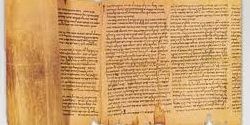The Deity of Christ and Early Church Testimony

Some critics, as well as most liberal theologians, maintain that the doctrine of the trinity was not part of the teachings of Jesus and the apostles, but merely invented by the church centuries later. Emanuel Swedenborg, founder of the Church of the New Jerusalem claimed that the apostolic church knew nothing of the Trinity and that the Trinity was really fabricated by the Council of Nicea in the fourth century as a belief in three Gods, not the one true God, which he believed was unipersonal: "A Trinity of Persons was unknown in the Apostolic church, but was hatched by the Nicean Council," and "No other trinity than a trinity of Gods was understood by the members of the Nicean Council...[and] so understood by the whole Christian world as well."1 Likewise, in a sermon given in August, 1964, at New York City, liberal theologian James A. Pike declared, "The Trinity is not necessary. Our Lord never heard of it. The apostles knew nothing of it." Victor Paul Wierwille, founder of "The Way International," claims in his book, Jesus Christ Is Not God, that the early church (to 330 A.D.) never believed in the Trinity or in Christ’s deity. He argues, "Certainly, during this time, church leaders spoke of the Father, Son, and Holy Spirit, but they never referred to them as co-equal.... In fact, the opposite was the case. They spoke of the Father as supreme, the true and only God... and of the son as inferior... having a beginning, visible, begotten, immutable."
2 But is this really what we find when we carefully examine the writings of the earliest Christian leaders, or is this merely an invention by those who, for whatever reason, choose not to believe in the Trinity? The following twenty-two chronological examples of key leaders show that the early church clearly believed that Jesus Christ was God:
Ignatius of Antioch (30-107 A.D.). He was born before Christ died and consistently spoke of the deity of Jesus Christ. Consider a few examples: In his writings To the Ephesians, To the Romans, To the Magnesians and other letters, we find references such as the following: "Jesus Christ our God"; "who is God and man"; "received knowledge of God, that is, Jesus Christ"; "for our God, Jesus the Christ"; "for God was manifest as man"; "Christ, who was from eternity with the Father"; "from God, from Jesus Christ"; "from Jesus Christ, our God"; "Our God, Jesus Christ"; "suffer me to follow the example of the passion of my God"; "Jesus Christ the God" and "Our God Jesus Christ."3 The fact that Ignatius was not rebuked, nor branded as teaching heresy by any of the churches or Christian leaders he sent such letters to proves that the early church, long before 107 A.D., accepted the deity of Christ.
Polycarp (69-155 A.D.). He possibly spoke of "Our Lord and God Jesus Christ."4
Justin Martyr (100-165 A.D.). He wrote of Jesus, "who... being the first-begotten Word of God, is even God."5 In his Dialogue with Trypho, he stated that "God was born from a virgin" and that Jesus was "worthy of worship" and of being "called Lord and God."6
Tatian (110-172 A.D.). This early apologist wrote, "We do not act as fools, O Greeks, nor utter idle tales when we announce that God was born in the form of man."7
Theophlius (116-181 A.D.). He was the first to use the term "Trinity" in his Epistle to Antolycux II, xv.8
Irenaeus of Lyons and Rome (120-202 A.D.). He wrote that Jesus was "perfect God and perfect man"; "not a mere man...but was very God"; and that "He is in Himself in His own right...God, and Lord, and King Eternal" and spoke of "Christ Jesus, our Lord, and God, and Saviour and King."9
Tertullian of Carthage (145-220 A.D.). He said of Jesus "Christ is also God" because "that which has come forth from God [in the virgin birth] is at once God and the Son of God, and the two are one...in His birth, God and man united." Jesus is "both Man and God, the Son of Man and the Son of God."10
Hippolytus (170-235 A.D.). He said, "[it is] the Father who is above all, the Son who is through all, and the Holy Spirit who is in all. And we cannot otherwise think of one God, but by believing in truth in Father and Son and Holy Spirit.... For it is through this Trinity that the Father is glorified.... The whole Scriptures, then, proclaim this truth." And, "the Logos is God, being the substance of God."11
Caius (180-217 A.D.). He was a Roman Presbyter who wrote of the universal Christian attestation to the deity of Christ in his refutation of Artemon, who maintained that Christ was only a man. Caius appealed to much earlier writers, all of whom taught Christ’s deity: "Justin and Miltiades, and Tatian and Clement, and many others—who is ignorant of the books of Irenaeus and Melito, and the rest, which declare Christ to be God and man? All the psalms, too, and hymns of brethren, which have been written from the beginning by the faithful, celebrate Christ the Word of God, ascribing divinity to Him.... [This] doctrine of the Church, then, has been proclaimed so many years ago,..."12
Gregory Thaumaturgus of Neo-Caesarea (205-270 A.D.). He declared in On the Trinity, that "All [the persons] are one nature, one essence, one will, and are called the Holy Trinity; and these also are names subsistent, one nature in three persons, and one genus [kind]."13 He referred to Jesus as "God of God" and "God the Son."14
Novatian of Rome (210-280 A.D.). He wrote in his On The Trinity of Jesus being truly a man but that "He was also God according to the Scriptures.... Scripture has as much described Jesus Christ to be man, as moreover it has also described Christ the Lord to be God.... this same Jesus is called also God and the Son of God." "Christ Jesus [is] our Lord God."15 (Note, then, that in the 200’s we already had discourses on the Trinity.)
Origen of Alexandria (wrote ca 230 A.D.). He stated that Christ was "God and man."16 In 254 A.D. he wrote, "Jesus Christ...while he was God, and though made man, remained God as he was before."17
Athanasius (293-373 A.D.). This keen defender of New Testament teaching against the early Arian heresy, which taught that Jesus Christ was not God, declared of Jesus, "He always was and is God and Son," and "He who is eternally God,... also became man for our sake."18
Lucian of Antioch (300 A.D.). "We believe in... one Lord Jesus Christ, his Son, the only-begotten God...God of God.…"19
Alexander of Alexandria. He spoke in reference to Jesus of "his highest and essential divinity" and that he was "an exact and identical image of the Father."20
Eusebius of Caesarea. Stated that "the Son of God bears no resemblance to originated creatures but...is alike in every way only to the Father who has begotten [Him] and that he is not from any other hypostasis and substance but from the Father."21 And (325 A.D.), "We believe in... one Lord Jesus Christ, the word of God, God of God.…"22
Cyril of Jerusalem (ca 350 A.D.). "We believe in... One Lord Jesus Christ, the only begotten Son of God...very God, by whom all things were made."23
Epiphanius of Constantia (374 A.D.). "We believe...in one Lord Jesus Christ...of the substance of the Father, Light of Light, very God of very God."24
Augustine. Declared that Christians "...believe that Father, Son, and Holy Spirit are one God, maker and ruler of the whole creation: that Father is not Son, nor Holy Spirit Father or Son; but a Trinity of mutually related Persons, and a unity of equal essence," and that therefore, "the Father is God, the Son is God, and the Holy Spirit God; and all together are one God."25
Tertullian. Wrote of Jesus that "He is God and man.... We have here a dual condition—not fused but united—in one person, Jesus as God and man."26
Proclus. "He was born of woman, God but not solely God, and man but not merely man.....Christ did not by progress become God—heaven forbid!—but in mercy he became man, as we believe. We do not preach a deified man; we confess an incarnate God...him alone who was born of a virgin, God and man."27
Cyril of Alexandria. Wrote of Jesus, "For he remained what he was; that is, by nature God. But...he took it on himself to be man as well," and, "There is nothing to prevent us from thinking of Christ as being the one and only Son at once both God and man, perfect in deity and perfect in humanity...he is conceived of as God and is God,..."28
From the very first the leaders of the Christian church—immediately after the time of the apostles up to the Council of Nicea in the fourth century and beyond—had consistently believed and taught that Jesus Christ is God. Therefore, those who deny this are clearly mistaken when they maintain that the Trinity was "invented" by Christians only in the 4th century or later.
There is only one logical explanation for the abundant early testimony to the deity of Jesus Christ: early church leaders were simply declaring what was already declared by Jesus Christ and the apostles in Holy Scripture: that Christ was indeed God. As Gregory of Nazianzus stated in his "Third Theological Oration Concerning the Son," "From their [the apostles] great and exalted discourses we have discovered and preached the deity of the Son."29 E. Calvin Beisner, author of God in Three Persons, states:
The testimony of the New Testament to the deity of Christ is unanimous.... Were there no passages at all which directly call Christ God, we would still have a great weight of evidence that is the New Testament conception of him, for in all senses he is depicted as precisely parallel to God the Father. C. F. D. Moule wrote: "Far more impressive than any single passage are two implicit Christological ‘pointers.’" At first is the fact that, in the greetings of the Pauline epistles, God and Christ are brought into a single formula. It requires an effort of imagination to grasp the enormity that this must have seemed to a non-Christian Jew. It must have administered a shock comparable (if the analogy may be allowed without irreverence) to our finding a religious Cuban today inditing a message from God-and-"Che" Guevara…."
The other Christological pointer, evidenced early… [is the undeniable] fact that Paul seems to experience Christ as any theist reckons to understand God—that is, as personal, but as more than individual: as more than a person. This is evidenced by certain uses (though admittedly not all) of the well known incorporative formulae, "in Christ."…30
The truth is that for all those who deny Christ’s deity—as for the early Arians—the Trinity is simply a stumbling block to their rationalism. What they cannot fully comprehend, they will not accept. Thus, the doctrine of the Trinity cannot be rejected on biblical or historical grounds because the testimony for it is too abundant. It can only be rejected on philosophical and personal grounds which have no merit.



